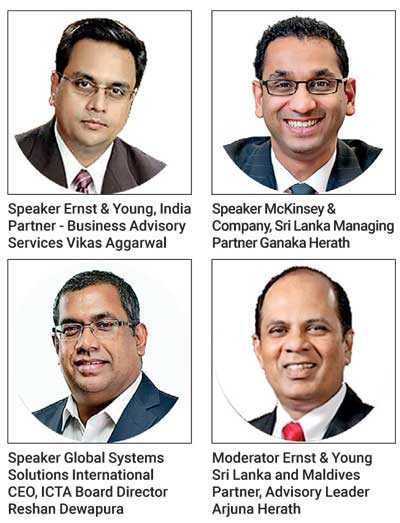Friday Feb 20, 2026
Friday Feb 20, 2026
Tuesday, 5 May 2020 01:18 - - {{hitsCtrl.values.hits}}
Nations around the world are accelerating their digitalisation efforts. COVID-19 pandemic has given an impetus to this. Many countries are embracing a vision to build a Digital Nation with enhanced economic vitality, robust social safety nets, and efficient and fair governance with long-term social benefits of building an inclusive information society bridging the digital divide. 
FITIS, in collaboration with EY, will host a webcast titled ‘A Roadmap for Sri Lanka to be a Digital Nation’ at 4 p.m. tomorrow, discussing a roadmap for Sri Lanka to promote digitalisation at a national level to increase economic efficiency in industry and government, through the creation of right policies, required infrastructure, and new business models and mechanisms.
“The Digital Nation will become a part of the fabric of an economy, society and governance, and will rely on technological capabilities and supporting policies,” stated FITIS Chairman Abbas Kamurdeen.
He further added: “We are happy to note that we have been able to put together a renowned panel of speakers and have EY as our knowledge partner for this forum, which we believe is of national importance and will help Sri Lanka to respond effectively to the unprecedented impact of the COVID-19 pandemic on our economy, society, and people.”
The speakers at this session will be Ernst & Young, India Partner Vikas Aggarwal, who leads EY’s charter on Smart Cities Technologies, Digital Infrastructure and Tech for Education; McKinsey Managing Partner – Sri Lanka Ganaka Herath, who has a focus on digital and analytics transformations; and Global Systems Solutions International Ltd. CEO and ICTA Board Member Reshan Dewapura.
The session will be moderated by EY Sri Lanka and Maldives Partner, Advisory Leader Arjuna Herath. Herath commented: “Digital Nation will drive convergence of finance and technology, resulting in the emergence of a new wave of FinTech enterprises; in transportation, new business models of ride-sharing and intelligent transportation systems (ITS) will increase carrying capacity and speed, and lower the failure rate of infrastructure; in energy, smart grid technology will optimise power generation, transmission, transformation, storage, distribution, and consumption; in the social sphere, optimising resource allocation will improve lives; in healthcare, intelligent health risk prevention, public medical resources sharing, and collaborative operation of medical facilities will create a healthier society; and in education, remote education, customised content, and virtual classrooms will increase the knowledge and skills of our students and people.
“In respect to governance, digitalisation will improve government efficiency and urban administration and facilitate interactive policy channels, self-service transactions, integrated data management, and reliable information encryption in order to improve government services.”
Every nation encounters difficulties and challenges during the process of digitalisation, including ambiguity about organising and implementing the initiatives, insufficient supporting resources, inadequate societal participation, a lack of flexible response to change, and lack of unified standards.
This webinar will discuss what specific initiatives may be required in the short- to long-term to realise the vision of a Digital Nation while overcoming obstacles and challenges that impede this journey.
Registration for the webcast can we secured via http://tiny.cc/1iaboz